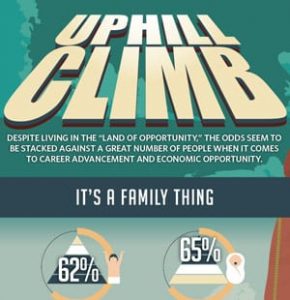
Career Advancement: The Uphill Climb
Despite living in the “Land of Opportunity,” the odds seem to be stacked against a great number of people when it comes to career advancement and economic opportunity.
It’s A Family Thing
62%
Americans who grow up in the top fifth bracket who stay in the top two-fifths
65%
Americans born into the bottom fifth who stay in the bottom two-fifths
Students from families in the bottom 50% of income make up just 14% of the undergrad population at the most competitive American universities.
Global Perspective
42%
American men raised in the bottom fifth income bracket who stay there
Compared to 25% in Denmark and 30% in Britain
8%
Those in the bottom fifth who rise to the top fifth
Compared to 12% in Britain and 14% in Denmark
Where You Can Get Ahead
Overcoming a rough start can be tough; how do major U.S. cities rank when it comes to upward mobility?
Odds of reaching the top fifth starting from the bottom fifth
San Jose, California 12.90%
Bakersfield, California 12.20%
Toms River, New Jersey 12.20%
San Francisco, California 12.20%
Santa Barbara, California 11.30%
Washington DC, District of Columbia 11.00%
Seattle, Washington 10.90%
Salt Lake City, Utah 10.80%
Scranton, Pennsylvania 10.70%
Honolulu, Hawaii 10.50%
Boston, Massachusetts 10.50%
New York, New York 10.50%
San Diego, California 10.40%
Newark, New Jersey 10.20%
Manchester, New Hampshire 10.00%
Santa Rosa, California 10.00%
Sacramento, California 9.70%
Los Angeles, California 9.60%
Reading, Pennsylvania 9.60%
Pittsburgh, Pennsylvania 9.50%
Poughkeepsie, New York 9.50%
Modesto, California 9.40%
Spokane, Washington 9.30%
Portland, Oregon 9.30%
Houston, Texas 9.30%
Madison, Wisconsin 9.20%
Brownsville, Texas 9.20%
Fort Worth, Texas 9.10%
Des Moines, Iowa 9.10%
Denver, Colorado 8.70%
El Paso, Texas 8.60%
Minneapolis, Minnesota 8.50%
Allentown, Pennsylvania 8.30%
Albany, New York 8.30%
Providence, Rhode Island 8.20%
Oklahoma City, Oklahoma 8.20%
Portland, Maine 8.10%
Gary, Indiana 8.10%
Las Vegas, Nevada 8.00%
Eugene, Oregon 7.90%
Bridgeport, Connecticut 7.90%
Harrisburg, Pennsylvania 7.90%
Omaha, Nebraska 7.80%
Tulsa, Oklahoma 7.80%
Syracuse, New York 7.70%
Phoenix, Arizona 7.50%
Fresno, California 7.50%
Erie, Pennsylvania 7.50%
Rockford, Illinois 7.40%
Philadelphia, Pennsylvania 7.40%
Miami, Florida 7.30%
Tucson, Arizona 7.10%
Dallas, Texas 7.10%
Kansas City, Missouri 7.00%
Austin, Texas 6.90%
Springfield, Massachusetts 6.80%
Sarasota, Florida 6.80%
Buffalo, New York 6.70%
Youngstown, Ohio 6.70%
Albuquerque, New Mexico 6.60%
Chicago,,Illinois 6.50%
Canton, Ohio 6.50%
Grand Rapids, Michigan 6.40%
Baltimore, Maryland 6.40%
San Antonio, Texas 6.40%
Port St. Lucie, Florida 6.20%
Pensacola, Florida 6.10%
South Bend, Indiana 6.00%
Tampa, Florida 6.00%
Baton Rouge, Louisiana 6.00%
Cape Coral, Florida 6.00%
Orlando, Florida 5.80%
Toledo, Ohio 5.70%
Nashville, Tennessee 5.70%
Knoxville, Tennessee 5.60%
Detroit, Michigan 5.50%
Richmond, Virginia 5.50%
Little Rock, Arkansas 5.40%
Virginia Beach, Virginia 5.40%
Lakeland, Florida 5.20%
Louisville, Kentucky 5.20%
Cleveland, Ohio 5.10%
New Orleans, Louisiana 5.10%
Mobile, Alabama 5.10%
Cincinnati, Ohio 5.10%
St. Louis, Missouri 5.10%
Raleigh ,North Carolina 5.00%
Birmingham, Alabama 5.00%
Dayton, Ohio 4.90%
Columbus, Ohio 4.90%
Jacksonville, Florida 4.90%
Indianapolis, Indiana 4.90%
Greenville, South Carolina 4.70%
Greensboro, North Carolina 4.70%
Milwaukee, Wisconsin 4.50%
Atlanta, Georgia 4.50%
Charlotte, North Carolina 4.40%
Fayetteville, North Carolina 3.80%
Columbia, South Carolina 3.70%
Memphis, Tennessee 2.80%
Getting Ahead
Education
There’s no doubt that education is the first step toward improving your lot in life.
Median weekly earnings by educational attainment
Doctoral degree $1,624
Professional degree $1,735
Master’s degree $1,300
Bachelor’s degree $1,066
Associate degree $785
Some college $727
High school $652
Less than high school $471
Here are a few tips for turning yourself into a success story in college:
- Apply for work-study.
- Exhaust all your financial aid options, especially free money like grants.
- Search for local aid.
- Connect with your professors.
- Pursue your passion, not just what you think will get you a job.
- Take control; after all, it’s your education.
- Read the syllabus for every course as soon as you get it.
- Make a friend in each class.
- Establish a study routine.
- Start early on long-term projects.
- Never buy new textbooks (if you can help it).
Employment
Overcoming your status at birth isn’t a simple proposition. But a few advancement-related tips might help.
46%
Percentage of people who have asked for or negotiated a pay raise
Of those who asked …
… 25% got more than they expected
… 38% got exactly what they expected
… 17% got more money but not what they were hoping for
… 5% got a non-raise incentive
… 15% got nothing
So it pays to ask; only 1 in 5 people didn’t get a raise when they asked for one.
How to get promoted:
- Work for a company that gives you room to grow.
- Do the best you can in your current position.
- Make sure the right people know you’re doing a great job.
- Develop good relationships with people you work with.
- Make sure the right people know you want a promotion.
- Apply for jobs within the company.
- Seek out new skills (e.g. extra school, another language).
- Seek a mentor in someone higher up.
- Groom a successor.
- Develop a new position.
- Seek employment elsewhere if at a dead end.
Sources:
http://www.nytimes.com
http://www.theatlantic.com
http://obs.rc.fas.harvard.edu
http://www.cbsnews.com
http://www.wikihow.com

 The Best Colleges
The Best Colleges The Lowest Costs
The Lowest Costs The Highest Returns
The Highest Returns